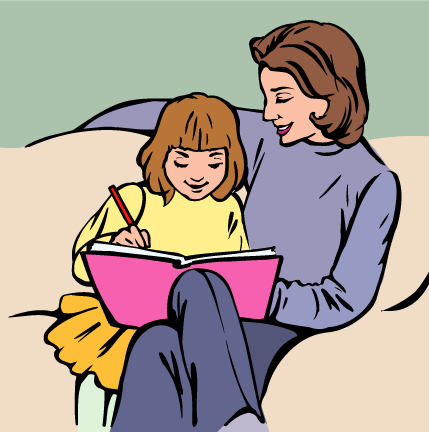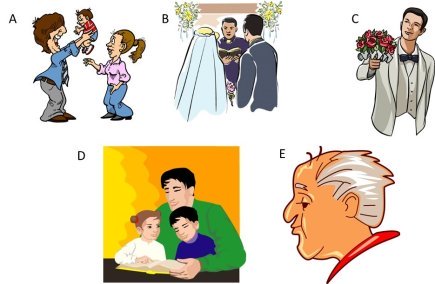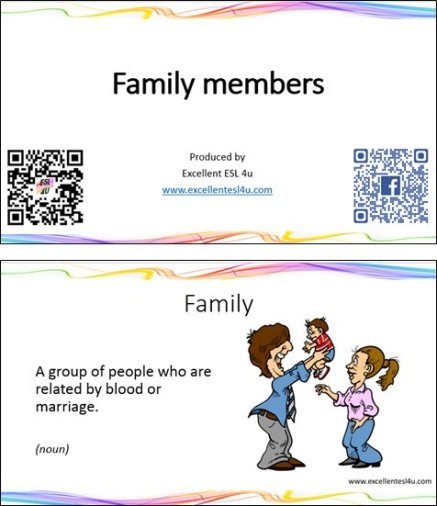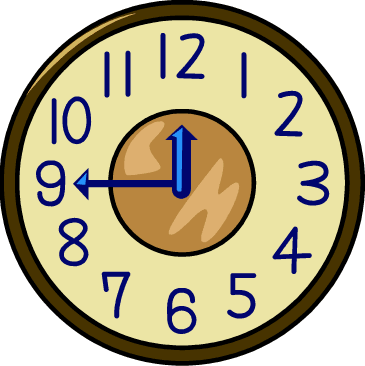ESL Family Members Vocabulary
When you make new friends they often want to know about your family, this ESL family members vocabulary page will teach you lots of the words you will need to be able to talk about your family. After looking at this page you will be able to talk to people about your family.

The first part of this page is a vocabulary list with definitions. This list contains all the vocabulary you will need to be able to describe families. Try to learn as many of the words as possible. To help you do this there are some flashcards that you can download to use when you are away from your computer. Then there is a recording of the vocabulary being spoken by a native English speaker so you can hear the correct pronunciation.
Finally there is a section with three exercise for you to do that will test how much of the vocabulary you remember. The exercises are as follows:
- Identify the correct definition of a word.
- Identify the correct word that matches a definition.
- Identify the correct word that matches a picture.
ESL Family Members Vocabulary List with Definitions
Below is the ESL family members vocabulary list. You should learn as much as you can by looking at the words and the definitions. It can also be used as a reference source for when you find a word you do not know: just come and look it up. Then there are the flashcards with pictures that you can download, and finally the recording of the ESL family members vocabulary being pronounced by a native English speaker.
Adult: A person who has finished growing and is no longer a child. (noun)
Adopt: To legally take someone else’s child to become your own child. (verb)
Aunt: The sister of your father of mother, or the wife of your uncle. (noun)
Baby: A very young child who is not yet able to speak or walk. (noun)
Bachelor: A man who has never been married. (noun)
Bachelorette: A woman who has never been married. (noun)
Boy: A male child or a young male person. (noun)
Brother: A boy or man who has the same parents as you. (noun)
Born: To come out of your mother’s body and to start to exist. (verb)
Birth: The time when a baby comes out of its mother’s body. (noun)
Birthday: The day each year which is the same date as the one on which you were born. (noun)
Bride: A woman on her wedding day. (noun)
Bridegroom: A man on his wedding day. (noun)
Bring up: To look after a child and teach him or her how to behave, etc. (verb)
Child (plural: children): A young person who is below the age of puberty or below the legal age of maturity. (noun)
Couple: Two people who are married or having a romantic relationship. (noun)
Cousin: The child of your uncle or aunt. (noun)
Daddy: A child’s word for a father (also dad). (noun)
Daughter: Someone’s female child. (noun)
Daughter-in-law: The wife of your son/child. (noun)
Delivery: The process of giving birth. (noun)
Descendant: Someone who is related by blood to a person who lived a long time ago. (noun)
Divorce: To legally end a marriage. (verb)
Divorced: To be no longer married to your wife or husband. (adjective)
Elder: To be born first. (adjective)
Engagement: An agreement between two people to marry in the near future. (noun)
Engaged: Having agreed to marry somebody. (adjective)
Family: A group of people who are related by blood or marriage. (noun)
Family tree: A drawing that shows the names of all family members over generations and how they are related to each other. (noun)
Father: A male parent. (noun)
Father-in-law: The father of your husband or wife. (noun)
Female: Relating to women or girls. (adjective)
Fiancé: The man to whom a woman is engaged. (noun)
Fiancée: The woman to whom a man is engaged. (noun)
Foster: To take care of someone else’s child for a period of time but without becoming the legal guardian of the child. (verb)
Girl: A female child or a young female person. (noun)
Give birth: To produce a baby from your body. (verb)
Godchild: A child who has godparents. (noun)
Goddaughter: A female godchild. (noun)
Godfather: A man who is responsible to teach a child Christian moral and religious values. (noun)
Godmother: A woman who is responsible to teach a child Christian moral and religious values. (noun)
Godparents: People who are responsible to teach a child Christian moral and religious values. (noun)
Godson: A male godchild. (noun)
Grandchild: The child of your son or daughter. (noun)
Granddaughter: A female grandchild. (noun)
Grandfather: The father of your mother or father (same as grandpa). (noun)
Grandpa: The father of your mother or father (same as grandfather). (noun)
Grandmother: The mother of your mother or father (same as grandma). (noun)
Grandma: The mother of your mother or father (same as grandmother). (noun)
Grandson: A male grandchild. (noun)
Great-grandparent: The mother or father of your grandparent. (noun)
Half-brother: A brother who is the son of either your mother or your father. (noun)
Husband: The man that a woman is married to. (noun)
Labor: The process of childbirth from the start of contractions to delivery. (noun)
Late: No longer alive, to be dead. (adjective)
Male: Relating to men or boys. (adjective)
Man: An adult male person. (noun)
Marry: To become somebody’s husband, wife or life partner. (verb)
Marriage: The legal relationship between two people who are married. (noun)
Married: Having a husband, wife or life partner. (adjective)
Mother: A female parent. (noun)
Mother-in-law: The mother of your husband or wife. (noun)
Mummy: A child’s word for a mother (also mum) (noun)
Nephew: The son of your brother or sister, your husband’s brother or sister, and your wife’s brother or sister. (noun)
Niece: The daughter of your brother or sister, your husband’s brother or sister, and your wife’s brother or sister. (noun)
Old: Having lived for a very long time. (adjective)
Parent: The father or mother of a person. (noun)
Parents-in-law: The parents of your husband or wife. (noun)
Relative: A person connected to you by blood or marriage. (noun)
Raise: To care for and educate a child until adulthood. (verb)
Sister: A girl or woman who has the same parents as you. (noun)
Sibling: A brother or sister of the same parents. (noun)
Son: Someone’s male child. (noun)
Son-in-law: The husband of your daughter/child. (noun)
Spouse: Your husband or wife. (noun)
Stepbrother: The son of your stepparent or the person who is married to your parent. (noun)
Stepfather: The man who is married to your mother but is not your father. (noun)
Stepmother: The woman who is married to your father but is not your mother. (noun)
Stepsister: The daughter of your stepparent or the person who is married to your parent. (noun)
Twin: One of two children who are born to the same mother at the same time. (noun)
Uncle: The brother of your mother or father, or the husband of your aunt. (noun)
Wed: To marry. (verb)
Wedding: A marriage ceremony. (noun)
Widow: A woman whose husband has died and who has not married again. (noun)
Widower: A man whose wife has died and who has not married again. (noun)
Wife: The woman that a man is married to. (noun)
Woman: An adult female person. (noun)
Young: Having lived for only a short time; not fully developed. (adjective)
Vocabulary Flashcards for Family Members Vocabulary
The flashcards of the ESL family members vocabulary in this section can be downloaded and printed out so you can carry them with you wherever you go. Just click on the picture or link to start the download.
Family members vocabulary flashcards
Spoken Family Members Vocabulary
This part of the page has the ESL family members vocabulary presented as two recordings. The first is a simple recording that you can listen to. Then the second one is a video in which you can see the flashcards being shown at the same time as the words are pronounced by a native English speaker. Listen as often as you need to so that you can learn the correct way to say the words.
ESL Family Members Vocabulary Exercises

Exercise 1 – Correct Definition
In this ESL family members vocabulary task you need to select the best option (A-D) that corresponds to the word given in each question. At the end of the questions there is a link to click that will show you the correct answers.
ESL Family Members Vocabulary Definitions
Choose the correct definition for the family members vocabulary in this quiz.
Exercise 2 – Correct Meaning
This next ESL family members vocabulary activity is similar to the one above, only this time the definition is given in the questions and you need to choose the word (A-D) that goes with the definition. Again you can use the following link to see the correct answers.
ESL Family Members Vocabulary Identification of Meaning
Choose the word that matches the definition given in each of the five questions in this quiz.
Exercise 3 – Identify Picture
In the final ESL family members vocabulary exercise you need to decide which option (A-D) in each question matches each of the following pictures. When you have answered all the questions you can again use the link at the end of the questions to see your score.

ESL Family Members Vocabulary Picture Descriptions
Identify the best description for each of the images (A-E) given above that correspond to the five questions in this quiz.
Other Pages about Family Members that You
Might Like
ESL Family Members Conversations
ESL Family Members Listening
ESL Family Members Reading
ESL Family Members Writing
ESL 4u home › Vocabulary › Family Members


|
|




New! Comments
Have your say about what you just read! Leave me a comment in the box below.